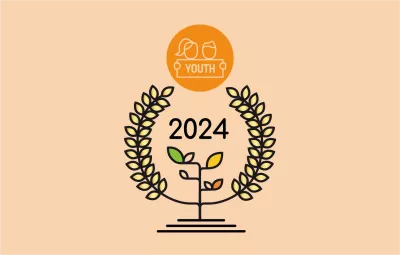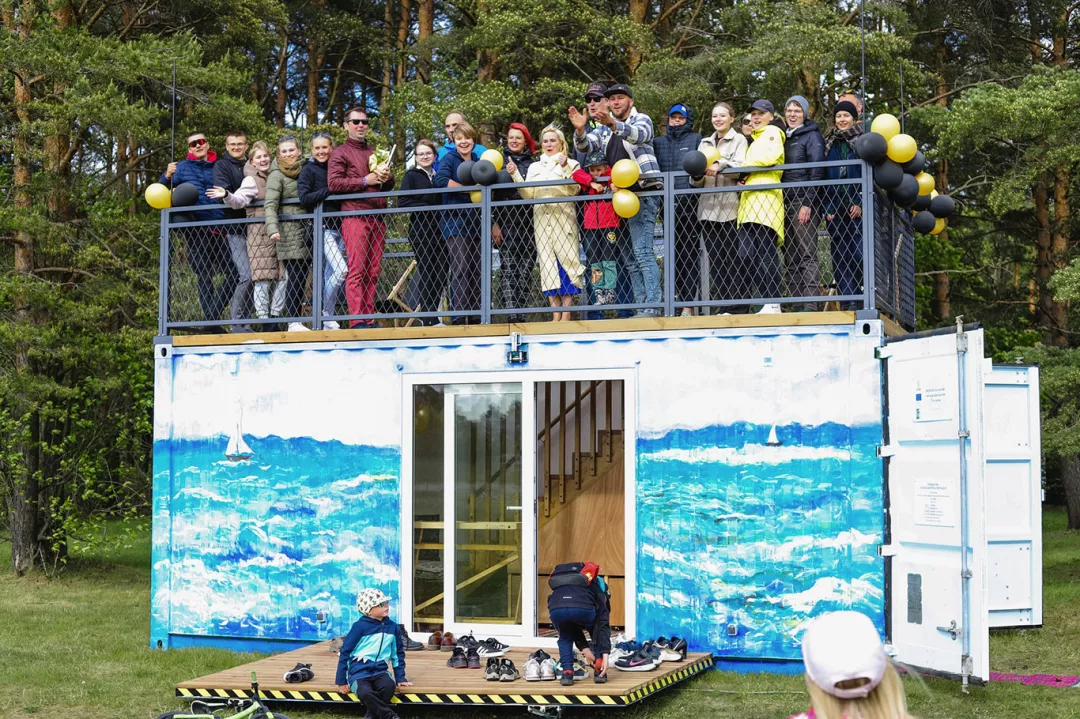General information
RDP Priority
- P6. Social inclusion and local development
RDP Focus Area
- 6B: Local development
RDP Measure
- M19: LEADER/CLLD
Beneficiary type
- Local / regional authority
Summary
Through the incredible determination and collaboration of Toila's youth, along with supportive individuals, companies and the municipality itself, a mobile youth centre housed in a repurposed 20-foot sea container became a very special gathering place for young people in eastern Estonia.
The centre is located in different areas of the Toila municipality throughout the summer and offers a service with an innovative and sustainable approach to local youth between the ages of 7 and 26, which empowers and supports the development of independent, initiative-taking, entrepreneurial young people who contribute to society.
The concept of the youth centre was created in cooperation with young people and based on their wishes, needs and interests. The sea container can be moved to different areas where young people gather, including those otherwise not reached by the services offered by youth work or who have moved away from them. The attractive appearance of the mobile youth centre also adds to its appeal.
In the past, the mobility of youth work has not yet been approached in this form in Estonia. This project is an indicator of how to create innovation in rural areas in cooperation with young people.
Results
In the first season (June-September):
- 170 people aged 7-19 visited the mobile youth centre (87 boys, 83 girls), 456 visits made, between 6-17 people per day.
- Around 40 youngsters from Toila municipality were able to participate in activities related to youth work for the first time.
- Youngsters held charity cafe earned 515 euros and donated it to a 12-year-old girl living in the community with serious illness.
- The centre has one youth mentor and three youth workers on shifts; two volunteers from Hungary and Azerbaijan are also involved.
- Project led by a nine-member youth team who were the project initiators and concept creators.
- Attractive environment for young people, promoting social interaction, self-initiative and civic activity.
- The quality of youth work services in Toila municipality has improved and become more uniform, ensuring a better service for all young people
- Young people participating in the project team have acquired practical knowledge and experience in project planning and implementation.

Promoter
Toila Municipal Government
Funding
Total budget: 43 217 (EUR)
EAFRD: 19 998 (EUR)
National/Regional: 4 999 (EUR)
Private/Own funds: 18 220 (EUR)
Ressourcen
Documents
Links
Context

Toila municipality is a sparsely populated region in eastern Estonia. Today, there are two stationary youth centres in the municipality which are located in larger areas (Voka and Kohtla-Nõmme townships). The content and quality of the services offered are inconsistent and located far away from the young people of sparsely populated areas.
In October 2021, the Toila Youth Council conducted a mapping of young people's interests and needs at Kohtla-Nõmme School and Toila Gymnasium, as a result of which it became clear that young people are left out of the service mainly for two reasons:
- Permanent youth centres are located logistically far from the young people's place of residence, and there are no easy connections between the home and the youth centre;
- Permanent youth centres offer services of very varying qualities, including the physical quality (interior, facilities) and appearance of the centres at different levels.
Attendance of permanent youth centres also drops significantly in the May-September period, as young people prefer to spend time outdoors and gather in groups, for example, in the area of the Kohtla-Nõmme Mining Museum and the skate park, in the beach area of Toila harbour and on the pump track in the village, or at Saka village park. The activities there are not focused or supported, and as a result, problems in the community arise, such as noise complaints, conflicts, littering and damage to public or privately owned property.
Objectives
The direct goal of the project was the construction and commissioning of a mobile youth centre in the Toila municipality by the summer of 2023.
The broader aim was to provide youth services with an innovative and sustainable approach to the young people of the Toila municipality aged 7-26 by means of the mobile youth centre and thereby empower and support the development of independent, initiative-taking, entrepreneurial young people who contribute to society.
The long-term goal is to support and guide young people in their integration into society, to prevent social exclusion and risky behaviour, and to offer the service in places where young people gather, thereby increasing the involvement of the youth taking part in the service.
Activities

The first task was to map the interests and needs of youth, and this was done by working with the Kohtla-Nõmme School and Toila High School under the leadership of the Toila Youth Council. The results of the research revealed the need for mobile services.
There was a co-creation process between the youth of Toila municipality and the product design master's degree students of the Estonian Academy of Arts, which resulted in the completion of the visual concept of the mobile youth centre. Brainstorming between the parties, building mini and life-size models, elevator pitches, teamwork and several inspiring meetings, both physically and online, led to the visual.
The project team consisted of nine young people aged 12-15 from Toila municipality, representing different villages of the municipality, namely Toila, Konju, Pühajõe, Kohtla-Nõmme and Voka. The team and the project promoter communicated with providers of special solutions for construction works, getting quotations.
A co-creation community day was held in Kohtla-Nõmme, where the youth of the project team and the Estonian Academy of Arts students introduced the concept and goals of the project to the community in a public space.
The main concrete task was, of course, to purchase the infrastructure, and this was in the form of a 20-foot sea container, which was then converted into the mobile youth centre. The exterior design of the container was created in cooperation with artists and young people from Toila municipality. The Estonian Academy of Arts was actively involved in the project and worked with the young participants, enabling elementary school-aged kids to experience the functioning of learning processes at the university level, thereby developing several key competencies that are important in the journey of becoming fully-fledged citizens. From the point of view of the institution promoting youth work, it was an extremely empowering cooperation experience, the like of which had never been implemented in the field of youth in Estonia.
Main results
In the first season (June-September), 170 young people aged 7-19 visited the mobile youth centre (87 boys, 83 girls). A total of 456 visits were made, with between six and 17 people attending per day. Around 40 youngsters from the Toila municipality were able to participate in activities related to youth work for the first time.
The mobile youth centre can be used in different ways. An example of this is the youngsters holding a charity cafe and earning 515 euros, which was then donated to a 12-year-old girl living in the community who has a serious illness.
The centre has one youth mentor and three youth workers working shifts, while last year, two volunteers from Hungary and Azerbaijan were also involved. The project is led by a nine-strong youth team, who are the heart of this project and the initiators of the project idea and the creators of the concept. They have acquired practical knowledge and experience in the project planning and implementation process.
The project has created an attractive environment for young people in public spaces based on their interests and needs. It promotes social interaction, self-initiative and civic activity. It has also improved the quality of youth work services in Toila and made them more uniform, ensuring a better service for all young people.
The centre also brings the fun directly to young people, significantly reducing the centre's environmental footprint, which is crucial in rural Estonia where public transportation is limited and institutions are far apart.
Key lessons
All parties showed faith in the youth and their ideas. The fact that people took the youngsters’ proposals and ideas seriously gave them even more encouragement to initiate and contribute to the development of the area.
Keeping young people at the age of self-discovery motivated is a challenge. Purposeful action and involvement saw this project last for two years without the team disbanding.
The project created a model that had never before been implemented in Estonia. Unsurprisingly, therefore, it has received recognition at both local and national level, winning competitions in 2023 such as Good Idea of the Year in the County and Youth Centre of the Year in Estonia.
Maarja-Liisa Lepsalu

